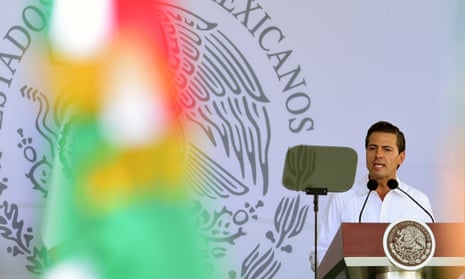Nearly 17 months after 43 Mexican students disappeared following their abduction by local police, President Enrique Peña Nieto has made his first visit to the city where the attack took place. But he avoided a meeting with the missing students’ families, instead overseeing a military ceremony on Wednesday to celebrate the national flag.
At the ceremony in Iguala – known as the birthplace of the Mexican tricolour – Peña Nieto made only brief references to the disappearance and probable massacre of the students on the night of 26 September 2014, an incident which fuelled large street protests against impunity and official corruption.
Flanked by senior military officers – including the head of the army, Gen Salvador Cienfuegos, who has refused to allow investigators to question soldiers over allegations they were involved in the attacks – Peña Nieto called for Mexicans to put their faith in the country’s embattled institutions.
“Throughout our national history, Mexicans have confirmed time and again that the best route to the future is the road of laws and institutions,” Peña Nieto said in a message apparently aimed at quelling criticism despite a looming currency crisis, slowing economic growth and simmering discontent over violent crime and corruption.
“The regrettable events occurring here in Iguala, in September 2014, provided evidence of the need to continue advancing on this route.”
The trip to Iguala came more than 500 days after the attacks on the students, a period in which Peña Nieto’s aloof response to the tragedy has generated widespread anger and sent his popularity plummeting.
The visit also comes as outside experts continue to question the findings of an official investigation – described in early 2015 as “the historic truth” by thenattorney general Jesús Murillo Karam. Two independent reviews of the investigation – by experts from the Inter-American Commission on Human Rights (IACHR) and the Argentine Forensic Anthropologists team – have rejected the government’s insistence that the students’ bodies were burned in a rubbish dump before their ashes were tossed into a nearby river.
On Sunday, IACHR investigators complained that their work had been obstructed by government and military officials who had limited their access to documents concerning the case and prevented them from questioning troops at an army base in Iguala.
Families of the 43 students insist still that their sons are still alive, express misgivings about the army and accuse the federal government of giving the investigation short shrift.
“Peña Nieto didn’t come [to Iguala] because of us,” said Emiliano Navarrete, whose son attended the Ayotzinapa normal school and is among the missing. “They have all the people and resources to find out what happened, but they invented a lie.”
Human rights groups expressed similar frustrations with the belated presidential visit, which appeared to be motivated by reasons related more to the military than the investigation.
“We regret that his first visit to the place that has come to represent the human rights crisis in this country comes in the context of a civic-military celebration,” said Santiago Aguirre, deputy director of the Miguel Agustín Pro Juárez Human Rights Centre, which has worked with the Ayotzinapa families.
Peña Nieto initially stayed silent after the Iguala attacks and waited weeks to travel to Guerrero state, though he eventually headed to Acapulco – down the highway from Iguala – to say Mexicans were “overcoming” the tragedy.
Since the attacks on the students, however, violence in Guerrero state, which includes Iguala, has only intensified.
Speaking on Wednesday, Peña Nieto defended the investigation, and said that Iguala should not be stigmatised by the attacks.
“For one year and five months, the Mexican government has deployed an enormous institutional effort to pursue justice, starting with a profound, transparent and open investigation,” Peña Nieto said.
“[Iguala] must not be marked by these tragic events. Its people deserve to be known for their strengths, warmth and firm character to achieve things in favour of their community.”

Comments (…)
Sign in or create your Guardian account to join the discussion